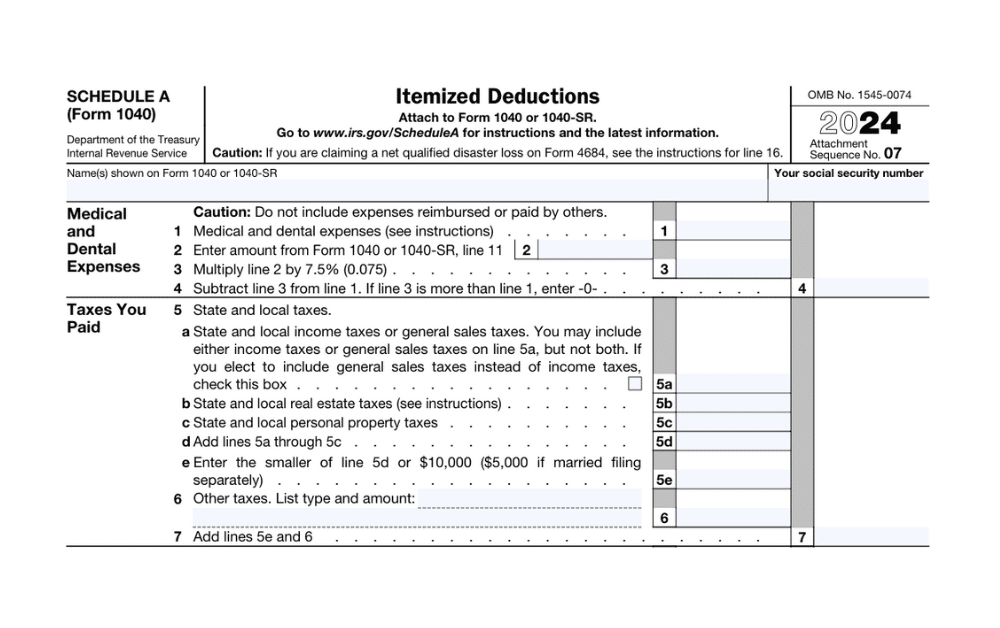Schedule A for American Expats: When Should You Itemize?

Schedule A is an IRS form that lets you claim itemized deductions instead of the standard deduction, and it could save American expats hundreds or thousands of dollars annually. For 2025, the standard deduction increased to $15,750 for single filers, $23,625 for head of household, and $31,500 for married filing jointly, thanks to new tax legislation signed in July 2025. If your itemized deductions exceed these amounts, Schedule A will reduce your tax bill more than taking the standard deduction.
Here’s the good news many expats need to hear: the Foreign Earned Income Exclusion for 2025 allows you to exclude up to $130,000 from US taxation, and most expats using Schedule A strategically end up owing little to no US taxes when they combine itemized deductions with expat-specific protections.
Schedule A covers specific expenses like foreign property taxes, mortgage interest on overseas homes, charitable donations to US organizations, and unreimbursed medical expenses. For expats dealing with higher living costs abroad, foreign healthcare expenses, or property ownership in multiple countries, these deductions can provide significant tax relief.
What Expenses Can Expats Deduct on Schedule A?
Schedule A groups deductions into several categories that benefit American expats:
Medical and Dental Expenses
You can deduct unreimbursed medical and dental expenses that exceed 7.5% of your adjusted gross income. This includes foreign health insurance premiums (if not paid with pre-tax dollars), medical examinations abroad, prescription medications, and medical transportation costs. For expats without employer-provided health coverage, these expenses add up quickly.
State and Local Taxes (SALT)
You can deduct up to $10,000 in state and local taxes ($5,000 if married filing separately). This includes foreign property taxes on homes you own abroad. Note: Foreign income taxes cannot be deducted here if you’re claiming the Foreign Tax Credit.
Interest Expenses
Mortgage interest on your primary residence and one additional home is deductible, even if the properties are located outside the US. The deduction is limited to mortgage debt up to $750,000 for loans taken after December 15, 2017.
Charitable Contributions
Donations to US-qualified charitable organizations are deductible. Foreign charities typically don’t qualify unless they’re registered as US 501(c)(3) organizations.
Get the Free Download That Makes Filing Taxes Simple
"*" indicates required fields

Should You Take the Standard Deduction or Itemize on Schedule A?
The decision comes down to math: if your total itemized deductions exceed the standard deduction for your filing status, itemizing saves money.
2025 Standard Deduction Amounts:
- Single filers: $15,750
- Married filing jointly: $31,500
- Head of household: $23,625
- Married filing separately: $15,750
Common Expat Scenarios Where Itemizing Makes Sense:
Expensive City Living: Sarah lives in Tokyo and pays $3,800 monthly rent. She also has $8,500 in medical expenses and donated $2,500 to US charities. Her potential itemized deductions total $11,000, which is less than the $15,750 standard deduction, so she should take the standard deduction.
Multiple Property Owner: Mike owns homes in both Texas and Germany. He paid $22,000 in US mortgage interest, $6,000 in Texas property taxes, $4,000 in German property taxes (totaling the $10,000 SALT limit), and $4,500 in qualifying medical expenses. His itemized deductions total $36,500, significantly exceeding the $31,500 married filing jointly standard deduction, saving him about $1,200 in taxes.
These calculations become more complex when factoring in the Foreign Earned Income Exclusion or Foreign Tax Credit, which affect your overall tax strategy.

How Does Schedule A Work with Expat Tax Benefits?
The interaction between Schedule A and expat-specific tax benefits requires careful planning.
- Foreign Earned Income Exclusion and Schedule A: If you’re using the FEIE to exclude income, you cannot deduct expenses directly related to that excluded income. However, personal expenses like mortgage interest on your residence, charitable contributions, and medical expenses are generally not considered related to your excluded income and can still be itemized.
- Foreign Tax Credit vs. Itemized Foreign Taxes: You cannot claim both the Foreign Tax Credit and itemize foreign income taxes on Schedule A for the same taxes. Most expats in high-tax countries benefit more from the Foreign Tax Credit, as it provides a dollar-for-dollar reduction in US taxes owed rather than just reducing taxable income.
- Foreign Housing Considerations: If you’re claiming the Foreign Housing Exclusion, those housing expenses cannot also be itemized on Schedule A. However, if you own property abroad and pay mortgage interest or property taxes separately from your housing exclusion calculation, those may still be deductible.
What Mistakes Do Expats Make with Schedule A?
- Currency Conversion Errors: All foreign expenses must be converted to US dollars using IRS-approved exchange rates for the year the expense was incurred. Using incorrect exchange rates can trigger audit flags.
- Double-Claiming Benefits: You cannot claim the same expense under multiple tax benefits. For example, housing costs claimed under the Foreign Housing Exclusion cannot also be itemized on Schedule A.
- Foreign Charity Confusion: Most foreign charities don’t qualify for US tax deductions. Use the IRS Tax Exempt Organization Search tool to verify eligibility before claiming donations.
- Missing Documentation: Keep detailed records of all foreign expenses, including receipts showing the organization name, amount, date, and currency. The IRS requires written acknowledgment for charitable contributions over $250.
When Should You Get Professional Help?
The interaction between Schedule A and expat tax benefits can be complex. Consider professional help if you:
- Own property in multiple countries
- Have significant foreign taxes paid
- Are self-employed abroad
- Have complicated medical or business expenses
- Are behind on filing and need to catch up
We have a rigorous hiring process for both our accountants and customer service representatives. Only an excellent CPA or Enrolled Agent will touch your return from start to finish, and all of our representatives have foundational knowledge of US expat tax rules. Peace of mind is something we deliver year-round, not just during tax season.
Your Next Steps for Schedule A
Whether to itemize or take the standard deduction depends on your specific situation, but either way, most expats owe little to no US taxes when properly using expat protections.
Start by gathering documentation for potential itemized deductions: medical receipts, property tax statements, mortgage interest statements, and charitable donation acknowledgments. Compare your total potential itemized deductions to the standard deduction amount for your filing status.
Remember: Americans abroad get an automatic extension to June 15 for filing (though any taxes owed are still due April 15), giving you extra time to organize your documentation and make the best decision for your situation.
If you’re ready to be matched with a Greenback accountant, click the get started button below. For general questions on expat taxes or working with Greenback, contact our Customer Champions.
This article is for informational purposes only and should not be considered personalized tax advice. Tax laws are complex and change frequently. Always consult with a qualified tax professional for advice specific to your situation. All dollar amounts, penalties, thresholds, and deadlines have been verified against current IRS sources as of 2025.



